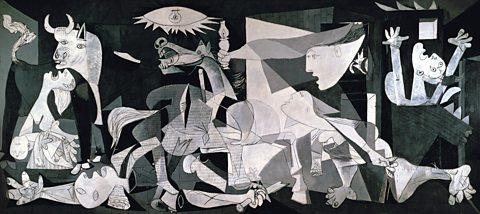Spanish Civil War

The Spanish Civil War (1936 - 1939) saw right-wing Nationalists, led by General Franco, fight against the left-wing Republicans. Germany and Italy supported the Nationalists with planes, tanks and weapons. The USSR supported the Republican forces.
The British government did not want the Spanish Civil War to escalate into a Europe-wide conflict and so signed up to the Non-Intervention Committee.
- Many people were concerned that this war could spread - this encouraged support for the British Government policy of non-intervention.
- Some people on the LeftA political term for the radical, reforming, or socialist section of a political party or system. ignored this and volunteered to fight in Spain. Many of them believed that only force would stop the spread of fascismA very right-wing set of political beliefs that requires complete unity on a national level and complete following of the rules. It is sometimes used as a metaphor to suggest someone who wants absolute control..
For some in the British political establishment, Spain confirmed their doubts about Britain’s policy of appeasement. Anthony Eden, who had been a supporter of the government’s non-aggressive approach, began to believe that Britain should take a firmer stance with Europe’s fascist dictators, and resigning his office in 1938.
Fear of the bomber
On 26 April 1937, Nazi German and Italian bombers attacked the Basque city of Guernica. Over the course of three hours, they destroyed three-quarters of the ancient town, killing and wounding hundreds.
The bombing of Guernica heightened fears of the consequences of any war. The British Prime Minister at the time, Stanley Baldwin, stated:
the bomber will always get through

It was believed aircraft would have a devastating impact. The British Government expected around 600,000 casualties in the first few days of any war.
The lack of air defences over Britain and a shortage of air raid shelters encouraged support for appeasementNeville Chamberlain, the British Prime Minister, was keen to avoid war. His policy was to appease Hitler, which usually meant giving into Hitler’s territorial demands. .